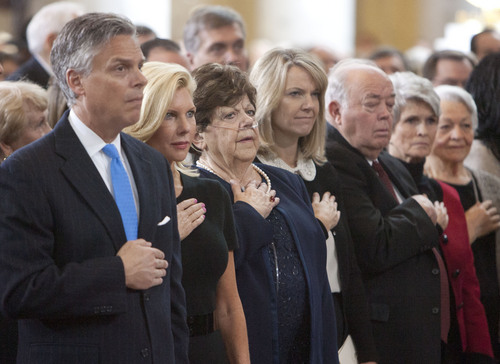This is an archived article that was published on sltrib.com in 2013, and information in the article may be outdated. It is provided only for personal research purposes and may not be reprinted.
Organizers of the Count My Vote named two more prominent Utahns Friday as co-chairs of its election reform initiative — former first lady Norma Matheson and former governor and secretary of Health and Human Services Mike Leavitt.
Matheson is the widow of Scott Matheson, the last Democrat to hold the office, and the mother of U.S. Rep. Jim Matheson and 10th U.S. Circuit Judge Scott Matheson Jr. She has remained a leader in the Utah Democratic Party.
"I remember when Utah was top in the nation for voter turnout, and I'm saddened to see we've dropped to the bottom," Norma Matheson said in a statement. "I support Count My Vote because it opens up the process for greater participation on the part of citizens. It is imperative that we increase voter participation and that every voice is counted."
Leavitt was elected to three terms as Utah governor and served from 1993 and 2003 before accepting a nomination as head of the Environmental Protection Agency under President George W. Bush. He later served as secretary of the U.S. Department of Health and Human Services.
He is founder and chairman of Leavitt Partners, a health consulting firm.
"Count My Vote is the most fundamentally important civic issue facing our state today," Leavitt said. "Utah's current system is restrictive and exclusionary. We need to give all Utah voters a voice in selecting their candidates."
Leavitt has been one of the organizers of the Count My Vote effort since its inception.
Matheson and Leavitt join Gail Miller — the owner of the Larry Miller Group and widow of Larry Miller —as co-chairs. Rich McKeown, Leavitt's longtime chief of staff, will serve as executive co-chairman.
Count My Vote is preparing to begin gathering the 102,000 signatures it would need to put an initiative on the 2014 ballot that would change Utah's current election nominating system.
Instead of the current system — where delegates chosen at neighborhood meetings frequently choose the party's nominees — Count My Vote is contemplating either a direct primary process or a system where candidates who gather enough signatures on petitions could get on a primary ballot along with the delegates' choice.
Count My Vote organizers argue the current system gives the delegates the power to essentially choose elected officials, since few Utah elections are competitive, thus driving down voter turnout and making politicians beholden to the delegates, who polls have shown are more strident in their views than average Utahns.
The group raised more than $500,000 in a relatively short window for its initiative drive.
Both the Democratic and Republican parties have endorsed the current system, saying it is an example of grass-roots politics, requires candidates to engage the delegates, meaning ideas are more important than money in the vetting process. Both parties, however, are working on potential reforms aimed at making the nominating process more inclusive.
Twitter: @RobertGehrke











